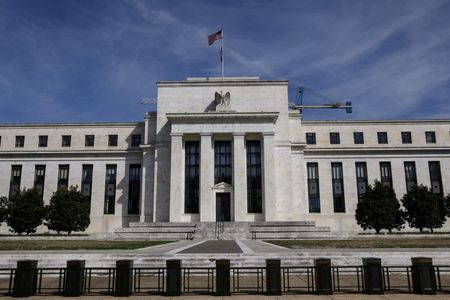
By Howard Schneider and Ann Saphir
WASHINGTON (Reuters) -The Federal Reserve on Wednesday raised its benchmark overnight interest rate by half a percentage point, the biggest jump in 22 years, and the U.S. central bank’s chief made a direct appeal to Americans struggling with high inflation to hang tough while officials take the hard measures to bring it under control.
In a widely expected move, the Fed set its target federal funds rate to a range between 0.75% and 1% in a unanimous decision, with further rises in borrowing costs of perhaps similar magnitude likely to follow. Fed Chair Jerome Powell, however, told reporters that a rate increase of as much as three-quarters of a percentage point is not something officials are “actively considering.”
The Fed also said it would start next month to reduce the roughly $9 trillion stash of assets accumulated during the coronavirus pandemic in another lever to bring inflation under control.
“It’s very unpleasant,” Powell said of the impact on households of inflation, which is running about three times the Fed’s 2% target. “If you’re a normal economic person, then you probably don’t have … that much extra … to spend and it’s immediately hitting your spending on groceries … on gasoline on energy and things like that. So we understand the pain involved.”
Powell, speaking in a news conference after the end of the Fed’s latest two-day policy meeting, said he and his colleagues were determined to restore price stability but that doing so would entail higher borrowing costs, including for things like mortgages and car loans.
“So it’s not going to be pleasant either, but in the end, everyone is better off … with stable prices.”
Nonetheless, the Fed said the economy is continuing to perform well, and Powell said it is well positioned to withstand the coming rate hikes, which are likely to be of a magnitude more like the one announced on Wednesday.
Despite a drop in gross domestic product over the first three months of this year, “household spending and business fixed investment remain strong. Job gains have been robust,” the central bank’s Federal Open Market Committee said in its policy statement.
Officials sharpened their description of the risks for elevated inflation to persist, especially with factors that have arisen since the start of the year, including the war in Ukraine and new coronavirus lockdowns in China. “The Committee is highly attentive to inflation risks.”
BALANCE SHEET REDUCTION
The statement said the Fed’s balance sheet, which soared to about $9 trillion as the central bank tried to shelter the economy from the pandemic, would be allowed to decline by $47.5 billion per month in June, July and August and by up to $95 billion per month starting in September.
Policymakers did not issue fresh economic projections after this week’s meeting, but data since their last gathering in March have given little sense that inflation, wage growth, or a torrid pace of hiring had begun to slow.
U.S. stock markets moved sharply higher after the announcement, extending gains after Powell poured cold water on the idea of hiking rates by three-quarters of a percentage point in the near future. Yields on government bonds moved lower. The dollar weakened against a basket of major trading partners’ currencies.
(Reporting by Howard Schneider;Additional reporting by Saqib Ahmed in New York;Editing by Paul Simao)

